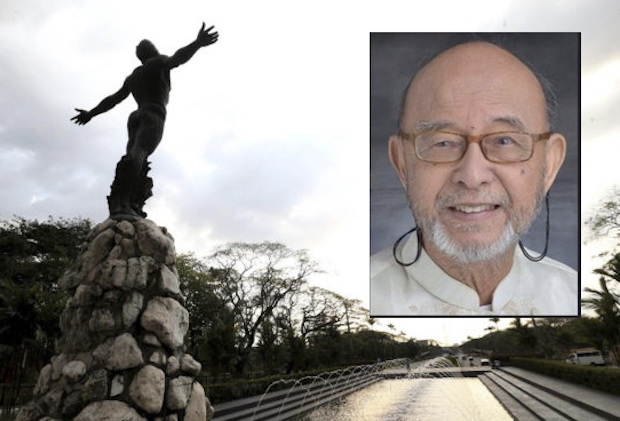Leader of peace: Jose Abueva, former UP president, dies at 93

Former UP President Jose Abueva
MANILA, Philippines — Former University of the Philippines (UP) President Jose Veloso Abueva, who helped forge the landmark 1989 accord limiting military and police presence on campus and who introduced the socialized tuition system in the country’s premier state university, died on Wednesday morning. He was 93.
His daughter, Rossana, told the Inquirer that he died of heart failure at 10:40 a.m. in his home in Beverly Hills, Antipolo City, in Rizal province.
A prominent public administration expert and political scientist, the Bohol-born scholar served as UP’s 16th president from 1987 to 1993 and served as chancellor of UP Diliman from 1990 to 1991.
In a 2004 essay by Japanese Buddhist philosopher and author Daisaku Ikeda, Abueva explained why he accepted the challenge of being UP president: “Throughout history, there have been many leaders of war, but there have been few leaders of peace. I am determined to help change this.”
One of his legacies was the 1989 UP-Department of National Defense (DND) accord, which he signed with then-Defense Secretary Fidel Ramos to limit the presence of state forces on campus to protect the university’s status as a bastion of free speech and freedom of expression.
It reaffirmed the 1982 accord between UP student leader Sonia Soto and then-Defense Minister Juan Ponce Enrile, which barred the police and the military from entering UP campuses without prior permission from school authorities to prevent the targeting of student and faculty activists for their political beliefs.
Landmark for democracy
The agreement also required law enforcers and government troops to report to UP if they had arrested or detained any UP student, faculty, or staff anywhere in the Philippines.
When he signed the accord on July 4, 1989, three years after the ouster of dictator Ferdinand Marcos, Abueva said the agreement was a “landmark in the evolution of our democracy, and the protection of the university’s academic freedom.”
But in January this year, Defense Secretary Delfin Lorenzana unilaterally abrogated the accord, claiming without basis that the university was a recruitment ground for communist rebels.
“I am appalled and dismayed by this unilateral abrogation,” Abueva said in reaction.
Tributes
In an effort to overcome the “sharpening elitist profile” of the UP studentry, Abueva introduced the socialized tuition scheme that would require wealthier students to pay higher fees and effectively “subsidize” UP’s poorer students.
On Wednesday, UP paid tribute to Abueva, saying that he brought “equitable development, nationalism and peace” during his tenure as president.
It said that socialized tuition and his introduction of UP’s Filipino language policy “were among the cornerstones of his legacy as UP president.”
During his presidency, Abueva advocated the use of Filipino in research and pedagogy and formed the university’s Sentro ng Wikang Filipino.
In a 2012 interview published in the Journal ng Wikang Filipino, Abueva said Filipino was often regarded as an “inferior” language compared to English, even within the country’s national university. But he challenged that assumption.
“We need to have a robust national language that is actually learned by many Filipinos,” he said. “It is bad for us that most of our educated can only speak in English when [it] is a colonial language.”
For federalism
After leaving UP, he founded Kalayaan College in Marikina in 2001 and served as a trustee of the Social Weather Stations.
A staunch supporter of federalism and the parliamentary system, Abueva was appointed chair of the 2005 consultative commission by then-President Gloria Macapagal-Arroyo to propose a revision of the Constitution.
He was secretary of the Philippine Constitutional Convention of 1971 and chair of the Legislative-Executive Military Bases Council from 1989 to 1990.
He earned his bachelor of arts in law (cum laude) at UP and his master of public administration and Ph.D. in political science at the University of Michigan. In 1968, he received UP’s Distinguished Scholar Award.
In a tribute to its former dean, the UP National Center for Public Administration and Governance honored his “legacy of service to the nation and to the university.”
Beta Sigma Fraternity also paid its respects to their “brod,” whom they called an “intellectual and public servant … who never failed to deliver.”
“He put his brilliant mind to good use, formulating and advocating for sound policy choices, most notable of which was a society without killing or the threat of such,” they said, referring to Abueva’s lifelong nonkilling advocacy.
Abueva is survived by his children Lanelle, Jobert, Rossana, and Jonas; and his grandchildren and in-laws.